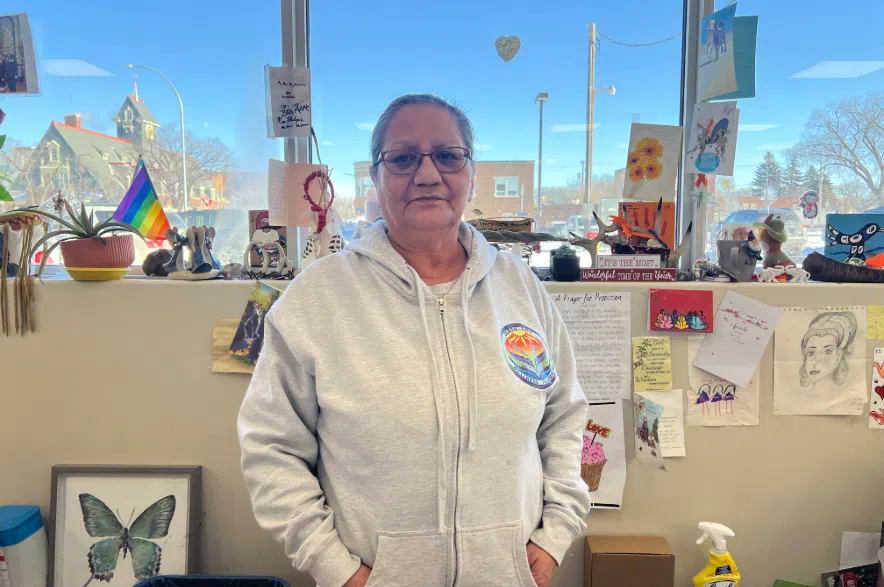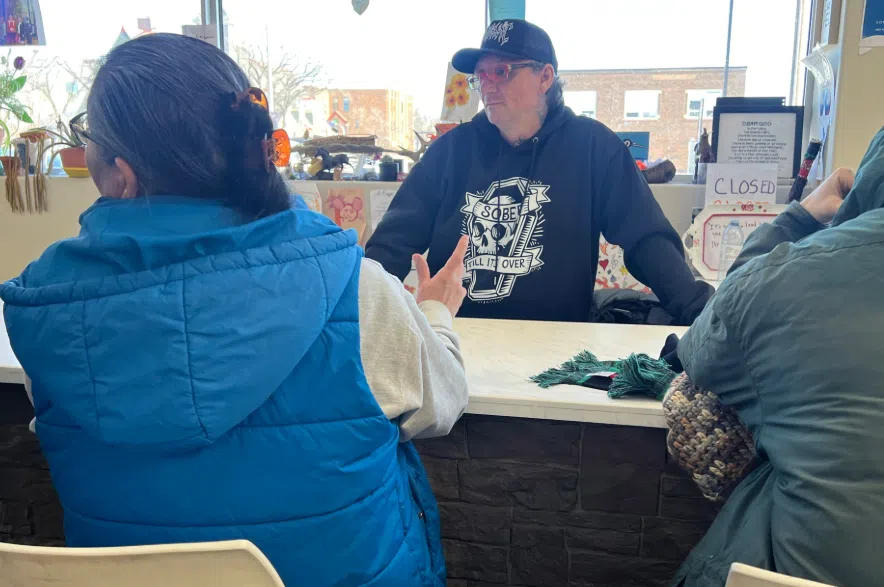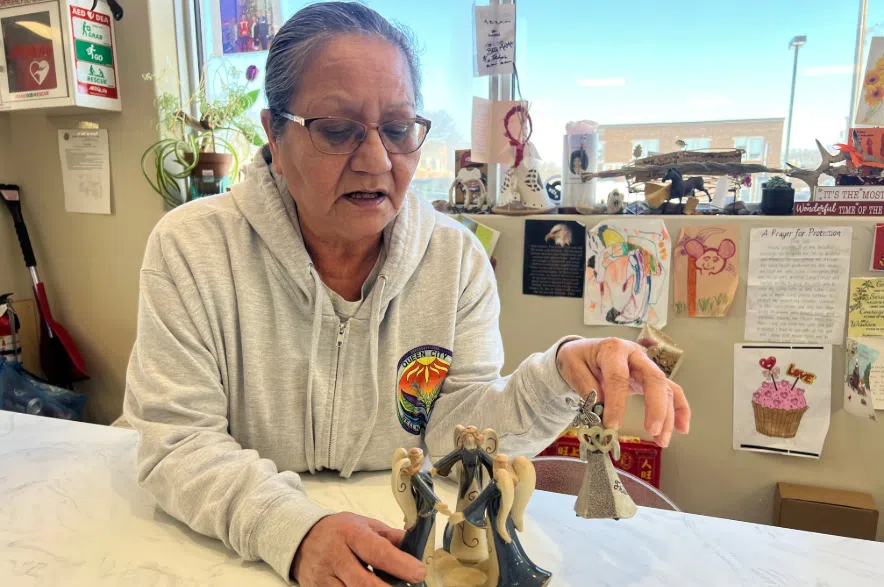One Regina woman is making a difference for the most vulnerable people in the community by offering her unwavering support.
When you walk into the Queen City Pharmacy, the quiet hum of conversation fills the space where people gather and visit while drinking coffee and eating snacks. At the centre of it all is the woman everyone calls Kokum, who chooses to be identified by the Cree word for grandmother rather than her given name.
Read More:
- ‘Be the village’: Saskatoon woman keeps homeless warm this winter
- NDP calls for more local beer, less American liquor in response to tariffs
- Protesters gather at Regina German Club against Buffalo Party event
For years, Kokum has dedicated herself to building relationships with people in need in the community, a mission she began after losing both her mother and son to addictions.
“All this community work started 35 years ago, but I only had one foot, one hand in it. But after I lost my mother and son, I went into it full,” she said.
Listen to the story on Behind the Headlines:

Kokum said helping Regina’s most vulnerable has turned out to have a much bigger impact than she ever could have imagined. (980 CJME/Abby Zieverink)
“My son was poisoned in 2016 when his life was taken. My mother’s life was taken in 1998, so it was a tragic hit on my family at that point. So instead of one foot into helping the community, I put both feet in and started helping.”
Kokum said she helps out those dealing with the justice system, the homeless, gang members, and people struggling with addictions.
“I look at them with respect, and I care about them. They know that I’ve shared a lot with them about my life, and they’ve shared a lot with me, so we have an open book for each other,” she said.
“I keep track of them. If they don’t show up for a couple of days, we’re looking for them, and I send the word out to the street and then they’ll come hustling back and say, ‘I’m here, Kokum. I’m OK. I’m sorry.'”
She said she helps in any way that’s needed, whether it is giving people a warm place to spend the day, accessing help from a social worker, helping with housing applications, offering assistance with court dates, or just handing out warm clothes, food and coffee. She said she also helps arrange visits with their children.
“A lot of them don’t have their children in their care, but have visits,” she explained.
“They come here to get snack bags for their kids when they go and visit. We build those for them. We build as much as we can so their visits are comfortable.”
Kokum said the assistance doesn’t stop inside the pharmacy, and often continues through the evening and on weekends.
“My daughters and I travel around at night. We are usually home between 9:30 p.m. and 11 p.m. We make hot chocolate, hot dogs, whatever we can put together. We’ll put it together and throw it in my van, and we’ll go out and deliver clothes, shoes, whatever we can,” she said.
“There are many times we’ve gone home with no shoes, no jacket because we gave them away. It doesn’t stop at 6 p.m. or on Friday or Saturday. Constantly, people come to my door saying that they’re hungry, so we’ll feed them and get them to where they need to be or direct them to a positive place where they could go and stay.”
Over the years, Kokum said she’s been able to create a tight bond with those she helps.
“They’re able to use their words now, and they express themselves more. There’s a lot of trust issues on the streets, and I know once you get past that barrier, which I have with many of them, we have a good relationship,” she said.
“That also makes a big impact on them. They’re not so lonely on the street because they’re so used to getting kicked out of everywhere they go… So here they come in and they get settled, and we get to know each other and we get to build a friendship and a relationship, and we try and help them out as much as we can.”
Kokum said many of the people she has helped on the street have ended up going home, and she spoke about one man who went back to his family in October.
“It was on my birthday, and I’ll always remember that day. He came in and was very upset. I brought him into our comfort room and we sat and chatted. He said, ‘I need to leave the streets because I’m done. I’m tired,'” Kokum explained.
“So lo and behold, I had his sister’s number in my home from a year previous, so I reached out to her. Her reply was, ‘Keep him there. We’re on our way. We’ll be there in four hours.’ So he went home.”
Kokum explained that helping the most vulnerable people in the community has turned out to have a more substantial impact than she first expected.
“They are important in my life as much as I am important in their life. I call them my relatives. It makes this kinship a lot stronger,” she said.
“I call them the kids – I love my kids so much. As much as I give, they give me more. Through respect, love, and everything else, they are givers. They don’t have anything, but they give through support, love, and respect.”

“She’s kind of the anchor to my sobriety,” said Delilah, who met Kokum when she went to the Queen City Pharmacy to get her medications. (980 CJME/Abby Zieverink)
Delilah, who was at the pharmacy meeting with Kokom, said the visits always make her feel safe.
“I was in active addiction, but I am now sober, and without Kokum, I don’t think I would be encouraged to come to the pharmacy every day to get my medication,” she said.
“She’s kind of the anchor to my sobriety.”
Delilah said Kokum and the regulars at the pharmacy feel like family to her.
“A lot of my elders have passed away, so to have her as like a bonus elder and (having) someone to look up to and to come to for my spiritual and traditional questions about my heritage is really awesome.”
Tyrell Tony described Kokum as strong-hearted and always giving.
“To me, she leads with bravery in her job,” he said.
“It’s not an easy job to be doing everything that she does for the community, and I can envision everything that she does with passion and compassion, and I just want to treat her with respect and honour.”
Charlie Lavalee said Kokum leaves a big mark on the lives of everyone she works with.
“Without her, we’d probably all be lost and still struggling,” he said.
“She’s my family. If I need help and if I have questions or concerns about something, I just ask her and she assists me. So it’s been very beneficial. She has a lot of knowledge, both both traditionally and health-wise.”
Ashton said he was met with open arms when he met Kokum for the first time.
“I remember my first time here was when I kind of ran away from Ranch Ehrlo because of the kind of insanity that was happening. I needed to get away; so I came here and Kokum very welcomingly invited me in and gave me some food and water and coffee,” said Ashton.
“Ever since then, I’ve just called her Kokum. She means a lot to me. She is kind of like a grandmother to me, or in other words, a kokum, because I am Métis.”
Kokum said she is always looking for donations to help the homeless, including socks, jackets, sweaters, hand warmers, and mittens.











